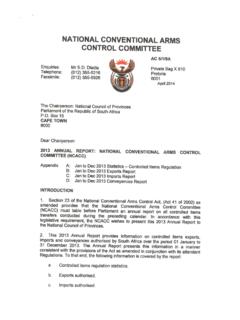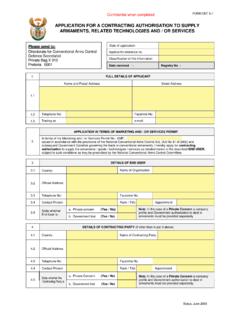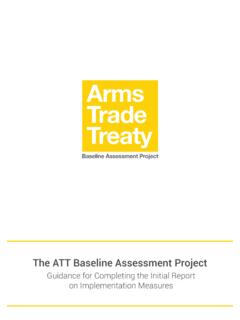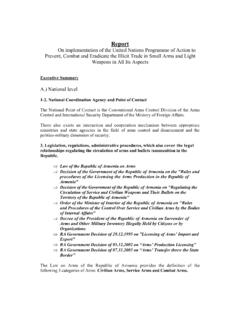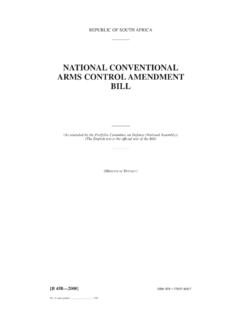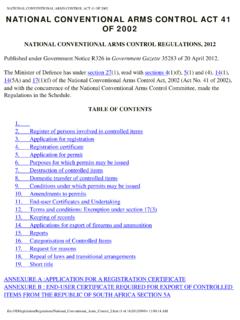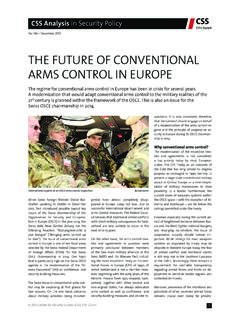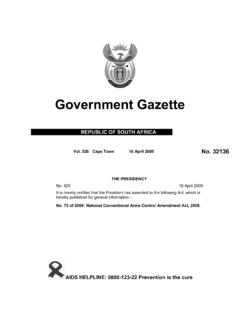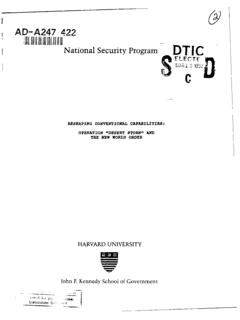Transcription of NPR 2.1: NATIONAL SECURITY AND ECONOMIC …
1 Sumner Benson The Nonproliferation Review/Fall 199416 NATIONAL SECURITY ANDECONOMIC CONSIDERATIONSIN CONVENTIONALARMS TRANSFER POLICYby Sumner BensonDr. Sumner Benson is Special Assistant in the Office of the Assistant Secretary of Defense for InternationalSecurity Policy. He has previously taught at Harvard University and at the University of Chicago and worked onarms control , nonproliferation, and international trade issues at the Central Intelligence Agency. Dr. Benson haspublished numerous articles on NATIONAL SECURITY and technology transfer. The views expressed in this article arethose of the author and not necessarily those of the Department of Defense or the United States analysts rec-ognize that conventionalarms transfers can encour-age the spread of nuclear weaponsand other weapons of mass destruc-tion.
2 For example, Joseph DiChiaroand Edward Laurance have pointedto extensive linkages betweennuclear and non-nuclear prolifera-tion and call for a more compre-hensive approach to disarmamentthan focusing solely on the spreadof nuclear weapons there is no international re-gime on conventional weapons com-parable to the Nuclear SuppliersGroup, the Zangger Committee, theMissile Technology control Regime(MTCR), or the Australia Laurance s recent analysis of theinternational arms trade since theend of World War II shows, nationalcontrols have been far more effec-tive than multinational and interna-tional controls in limiting Laurance also reminds usthat arms export policies changewith time. Shifting international al-liances, the emergence of new sup-pliers and recipients, and changesin markets, costs, and technologiesall affect the policies of the majorarms exporting article uses the author s ex-perience in the Department ofDefense (DOD) to explain how theUnited States approaches conven-tional arms transfers in the mid-1990s.
3 The article emphasizes thatarms export policymakers must con-sider a range of NATIONAL SECURITY andeconomic factors, some working infavor of, and some against, any givenarms transfer. In order to illustratethe interrelationship between secu-rity and ECONOMIC considerations,the article discusses in some depthtwo major issues in United Statesconventional arms transfer are first, the proper role ofeconomic competitiveness in decid-ing on arms exports and sec-ond, current concerns about Russia sarms sales to selected nations. Itshould be noted, however, that also must take accountof the ECONOMIC and SECURITY impli-cations of sales by Britain, France,China, and other arms article will first analyze theincreased impact of economics conventional arms sales to in-clude changes in NATIONAL and mul-tinational policy on limiting armstransfers.
4 Second, it will describethe ambivalence in current Russianarms transfer policy, which also isheavily influenced by ECONOMIC fac-tors. Russian policy combines dra-matic reductions in sales from theheight of the Cold War with con-tinuing sales to a few nations thatthe United States believes to bethreats to regional stability or con-tributors to the proliferation of weap-ons of mass destruction. Third, thepaper will show that Congress andthe Clinton administration are mov-ing toward agreement that, on bal-ance, SECURITY and nonproliferationconsiderations should have higher17 The Nonproliferation Review/Fall 1994 Sumner Bensonpriority than ECONOMIC consider-ations in arms exportdecisionmaking.
5 More tentatively,the paper concludes by suggestinghow this emerging consensus withinthe United States government mightbe extended to and Western ad-vocates of ECONOMIC competitive-ness, as well as to Russian ANDARMS EXPORTSThe collapse of the Soviet mili-tary threat and the growing impor-tance of international trade in na-tional foreign policies have raisedchallenges to the previous consen-sus that the United States shouldweigh SECURITY factors more heavilythan ECONOMIC factors in decisionson arms exports. In the political cli-mate of the mid-1990s, armamentssales are approached from the stand-point of trade balances, corporatesales, and employment as well as ofnational defense, arms control , Branch officials arepromoting military exports in orderto strengthen defense research anddevelopment (R&D) and productiv-ity and to energize the NATIONAL tech-nology base.
6 The Secretaries of Stateand Commerce have directed , foreign service offic-ers, and foreign commercial offic-ers to give full backing to (including defense com-panies) competing for contracts andprojects The Deputy Di-rector of the Defense SECURITY As-sistance Agency (DSAA), whichmanages government-to-governmentarms sales, has testified to Congressthat as our own defense spendingdecreases, defense exports have be-come much more important to theviability of individual defensefirms and to our overall defense in-dustrial base. 4 There have been dis-cussions (but not yet agreement)within both the Executive Branchand Congress about governmentloans to help finance military sales;such assistance is provided by thegovernments of other major West-ern defense the United States nowis the largest single arms exporter(see chart), competitive pressuresremain high because of stagnant ordeclining global demand for , historical experience sug-gests that continued preemi-Global arms Exports (Deliveries) By the Five Major Suppliers, 1988-1993(in billions of current dollars)Source.
7 Government estimates, September 1994* This figure is based on preliminary * Benson The Nonproliferation Review/Fall 199418nence cannot be taken for 1969, for instance, the UnitedStates held 60 percent of the inter- NATIONAL arms market, but by 1985,this share had fallen to 20 broadly, defense sales (likedefense R&D) are seen as helpingto strengthen high-technology civil-ian production. The Chair of thePresident s Council of EconomicAdvisors has stated in a study oninternational competitiveness that itis no accident that the countries thatboast the major commercial aircraftproducers are also the biggest arms -selling democracies. 6 The Clintonadministration is pressing the De-partments of Defense and Energy touse the technologies developed dur-ing the Cold War to help spur na-tional ECONOMIC growth.
8 In re-sponse, DOD has launched theTechnology for Technology program(the Perry initiative ) with Japan,which seeks to exchange de-fense technology for Japanese dual-use (civilian and military) technol-ogy. DOD also has announced theNational Flat Panel Display Initia-tive, with the intent both of lessen-ing the present dependence onoverseas suppliers for a critical mili-tary technology and of boosting anindustry that is important to overalltechnological , the increasing emphasison economics has brought sugges-tions that the United States may attimes have to reevaluate earlier in-ternational priorities. For instance, Trade Representative MickeyKantor told Congress shortly afterentering office that in this Admin-istration, trade policy is a part ofintegrated ECONOMIC policy, and thefundamental goal is economicgrowth and the creation of high-wagejobs for American workers.
9 Thenew Trade Representative then statedthat past Administrations had of-ten neglected ECONOMIC andtrading interests because of foreignpolicy and defense concerns but thatthe days when we could afford todo so are long past. 8 One mid-levelDSAA official told a DOD meetingin the summer of 1993:Some of you are still wor-ried about Russia and Chinaas competitors in militarypower. The competitors thatindustry is worried aboutare Britain, France, andother Western arms export-ers, because they are goingafter our share of the glo-bal defense ON EXPORTCONTROLSThe greater weight given to theeconomic aspects of arms transfershas modified and Western ex-port control Bush and Clinton adminis-trations have shifted responsibilityfor regulating export of many de-fense-related goods and servicesfrom the Department of State, whichexamines proposed exports prima-rily with an eye to foreign policyand NATIONAL SECURITY , to the Depart-ment of Commerce, which looksprimarily at corporate and nationaleconomic.
10 The Departments ofState and Defense now are approv-ing the sale abroad of communica-tions and navigation equipment,weapons systems, and defense-re-lated software that would not havebeen exported three or four yearsago. Recent DOD policy statementson release of specific weapons andtechnologies require that licensingofficers base their decisions on bothsecurity and ECONOMIC officers must examine notonly how the proposed export wouldaffect regional SECURITY , nonprolif-eration, and the maintenance of superiority, but alsohow it would affect defense sales andthe defense industrial base. Theyalso must judge whether a foreigncompany would be likely to makethe sale if the company wereprohibited from doing so ( foreignavailability of the proposed ex-port).


